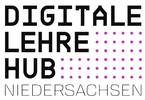Verbundprojekt „Digitale Lehre Hub Niedersachsen“
The DLHN joint project is being implemented in the field of Study and teaching will bring together all state universities in Lower Saxony in six sub-projects in order to drive forward the digitalisation of universities as a joint project. To this end, the project will be implemented over the next four years under the umbrella initiativeUniversity.digital Lower Saxony (HdN) of the state of Lower Saxony with funding from the VW Foundation totalling 25.4 million euros.
Information from the sub-projects and the results of the collaboration are presented on these pages.
The University of Oldenburg is involved in three of the new projects
In the area projects co-operation of services in the field of digital teaching ("Kooperation Services") and AI in studies, teaching and examinations ("KI"), employees from all 20 universities will work on informing teaching staff about current developments, establishing cross-location workflows for cooperation between the permanent units and also developing uniform standards (e.g. in dealing with AI) throughout the state. Last but not least, the sub-project Discovering, testing and providing innovative teaching/learning tools ("InnoTools") aims to respond adaptively to the rapidly changing requirements of the modern educational landscape byidentifying innovative learning and teaching tools and providing them sustainably at all locations . Innovative approaches are developed here to anchor digital technologies and skills in teaching and learning settings in a beneficial way and thus respond to rapid and dynamic developments, such as those seen in AI tools. The overarching goal is to realise cross-university co-operation between different units and anchor it in the long term in order to secure a locational advantage for Lower Saxony through synergy effects.
The three other sub-projects focus on protecting the digital sovereignty of universities, strengthening their infrastructure and promoting innovation at the same time . Lower Saxony is thus setting new standards in the field of software used in university teaching: the Open Source Development Network sub-project promotes the further development of the open source software solutions used here (Moodle, ILIAS, Stud.IP, Opencast and OERSI). In order to operate services securely and efficiently, the Data Centres must also work more closely together. Accordingly, the joint operation of commercial and open source software for teaching is being promoted. In the Clustered E-Assessment sub-project, cross-university digital examination services and test centres are being set up in order to jointly anchor innovative digital types of examination at universities. The " Emerging Tech Lab" sub-projectplaces a special focus on the targeted examination of upcoming "emerging" technologies. Here, impact and application scenarios for the effects on universities as a place of education are designed, discussed, made tangible and evaluated. This is done together with teachers, students and international experts. The aim is to better enable universities to respond to future disruptions.



